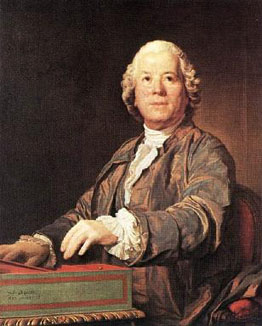Christoph Willibald Gluck became a reformer of
opera in what is now called the early classical period.
opera in what is now called the early classical period.
Historical Period: Classical
Nationality: Germany
Born: 2 July, 1714; Erasbach, Germany
Died: 15 Nov, 1787; Vienna, Austria
Cause of death: Stroke
Father: Alexander Gluck
Wife: Marianne Pergin
Daughter: Marianne (his niece, adopted)
Contemporaries: J.S. Bach, G.F. Handel
What's Happening in History? It is the 1700's; the First Copyright Act has been passed in Britain (1709); in North America there is fighting with the Tuscarora Indians; Jean Jacques Rousseau, the French philosopher, dies (1712); the same year that the Shawnee Indians established themselves in Ohio. The United States of America is not a country yet, just colonies (more world history during the 1700's here).
Beginning. It was around this time that Christoph Gluck was born to Alexander and Marianne Gluck on July 2, 1714 in the country of Germany. Alexander Gluck worked for Prince Lobkowitz as a gamekeeper to provide for the family. Although the name may make one think that it has something to do with sports, a gamekeeper took care of animals. Marianne, his mother, took care of the house and helped Alexander. Alexander's job for Prince Lobkowitz made it possible for Christoph to get a good education at the Jesuit School of Kommotau from twelve to eighteen years of age; a Jesuit is a kind of Catholic priest. Not much has changed today, parents are still responsible to make sure their children are in a good school. This is where Christoph received music lessons alongside his general education. At eighteen years of age, Christoph went to Prague, Austria, to continue studying music with Czernohorsky. I wonder if Christoph called his teacher Mr. Czerno or Mr. Hors for fun.
Working. As Christoph was studying in Prague, he had to work to pay for food, clothes, a place to live, and other necessities. At first, Christoph worked playing the violin at county fairs and dances. After a while, with the help of Prince Lobkowitz, Christoph was able to meet some richer families, which in turn helped him get a better job teaching music. It is good to ask others for help. In 1736, Christoph went to work in the city of Vienna and then moved to Milan, Italy to study with a famous teacher named Giovanni Battista San Martini. It was around this time, 1741-1745, that Gluck started writing operas, and Italians loved going to watch operas. Operas are like movies in that there are actors, cool costumes, and there is a story being told. But, operas also have something that movies do not have: singing! People liked Gluck's operas so much that he was invited to London to write more operas there; the first one is called La Caduta dei giganti. Gluck not only wrote operas, he also performed on musical glasses, which is kind of interesting! It was also in London that Christoph became friends with George Friedrich Handel, another famous composer. Gluck admired Handel so much that he kept a picture of Handel in his bedroom to be inspired by it.
Reforming. In 1762, with the help and encouragement of his friend, Raniero da Calzabigi, Christoph made some big changes to the way opera was performed. It was his opera Orfeo ed Euridice that showed off these changes. The overture started the opera to introduce the drama and mood; instead of having singers show off their singing skills, the opera now told the story simply. Poetry and music were now bound together to show the emotion of the story and dramatic continuity.
Christoph Gluck was the opera man, that's what he focused on in his life and he did not give up. Gluck's perseverance and openness made a big difference in the musical world. Do not give up on your music, keep pushing yourself!

No comments:
Post a Comment
Now it's your turn, what do you think?